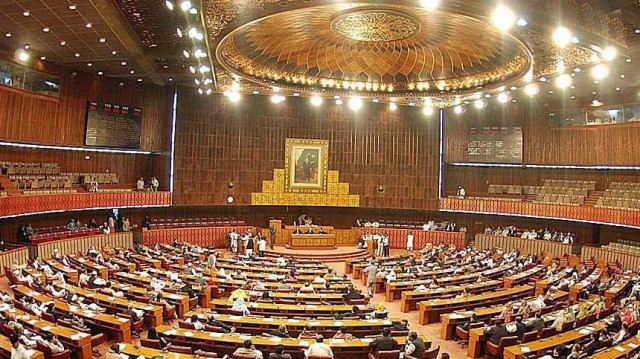Vital precedent: Oversight on foreign policy starts today
The strongest recommendation to be discussed is process of reaching understandings and agreements with the US.

Though many may term it an eyewash, a joint session of Parliament will set an important precedent today.
Parliament will kick off its new year, the current set-up’s final one, with a joint session today (Tuesday) where it will deliberate on key recommendations given by an all-party parliamentary panel on new terms of engagement with the United States as well as the country’s foreign policy in general.
In addition to this, they will take up three bills that expired in the Senate.
The strongest recommendation that will be discussed is process of reaching understandings and agreements with the United States.
The parliamentary debate was spurred by a series of events last year that resulted in strained relations between Islamabad and Washington – the low point of which was hit after an attack by international security forces on Pakistani forward bases along the border with Afghanistan on November 26 last year.
Following the attack, the government suspended vital supplies to Isaf forces in Afghanistan through its land route and had an airbase used by US vacated.
The bicameral parliamentary committee on national security was tasked to formulate recommendations for future terms of engagement with the United States before going for normalisation of bilateral ties.
The decision has provided an opportunity to civilian authorities to introduce some semblance of parliamentary say in foreign policy issues, which have traditionally been under the control of the powerful military.
The committee, headed by Senator Raza Rabbani, compiled several recommendations, which will come under discussion today.
Agreements in written
The panel has strongly recommended that all the agreements with the United States should be in written form and no verbal accord would be acceptable or valid. It said if there were any verbal agreements still in operation, they must be converted into written form.
The committee has also given guidelines for formulation of such foreign policy agreements.
First, it suggested, involve the concerned ministry. After it has been settled with them, it should then be routed to the law ministry, which should then forward it to prime minister, who would then have to get the cabinet’s nod. Only then would the agreement be deemed operational and valid.
It has also recommended that, in case of important agreements, the concerned minister or the foreign minister must brief Parliament over its contents, and, where necessary, its approval be sought.
Nato supplies
In its recommendations the multi-party committee has kept the issue of reopening of supplies to international forces in Afghanistan open-ended – not recommending a continued closure or a reopening.
However, it did say that there should be a proper monitoring mechanism for checking these supplies at entry and exit points. The committee has also recommended that the government enhance the fee charged for use of its land route, since the deal was earlier made on a very meager amount.
Monitoring of US personnel
It has been recommended that the number of US staff present in Pakistan on the pretext of diplomatic missions have clear limits and their activities be monitored closely.
Coalition Support Fund
The committee has also recommended that the mechanism for the claiming and releasing of finances from the Coalition Support Fund (CSF) be simplified. The CSF is a grant that the US gives to its frontline allies, most notably Pakistan, to reimburse it for expenditures on War on Terror-related operations.
Apology from the US
Among the set of recommendations, the committee has also urged the government to seek an apology from the United States over what it termed to be an unprovoked attack on Pakistani security check post that resulted in the killing of two dozen soldiers.
Drone strikes
There is no clear cut recommendation on how to deal with US drone strikes inside the tribal belt bordering Afghanistan. The committee only said that these were counter-productive and were yielding more damage than benefits.
Exchange of intelligence
The committee has also recommended that there should be more information-sharing and cooperation between the coalition forces in Afghanistan and Pakistan to curb militancy.
Lapsed bills
The joint session will also take up three bills that were passed by the National Assembly but not the Senate within the prescribed period of 90 days. Under the 18th Amendment, if a bill passed by one house is not passed by the other, it is put before a joint session of Parliament.
These bills include: Establishing a national fertilizer institute in Multan, the home town of Prime Minister Gilani, a bill on stock exchanges and another one on domestic violence.
(Read: Pakistan-US relations: year end review)
Published in The Express Tribune, March 20th, 2012.


















COMMENTS
Comments are moderated and generally will be posted if they are on-topic and not abusive.
For more information, please see our Comments FAQ